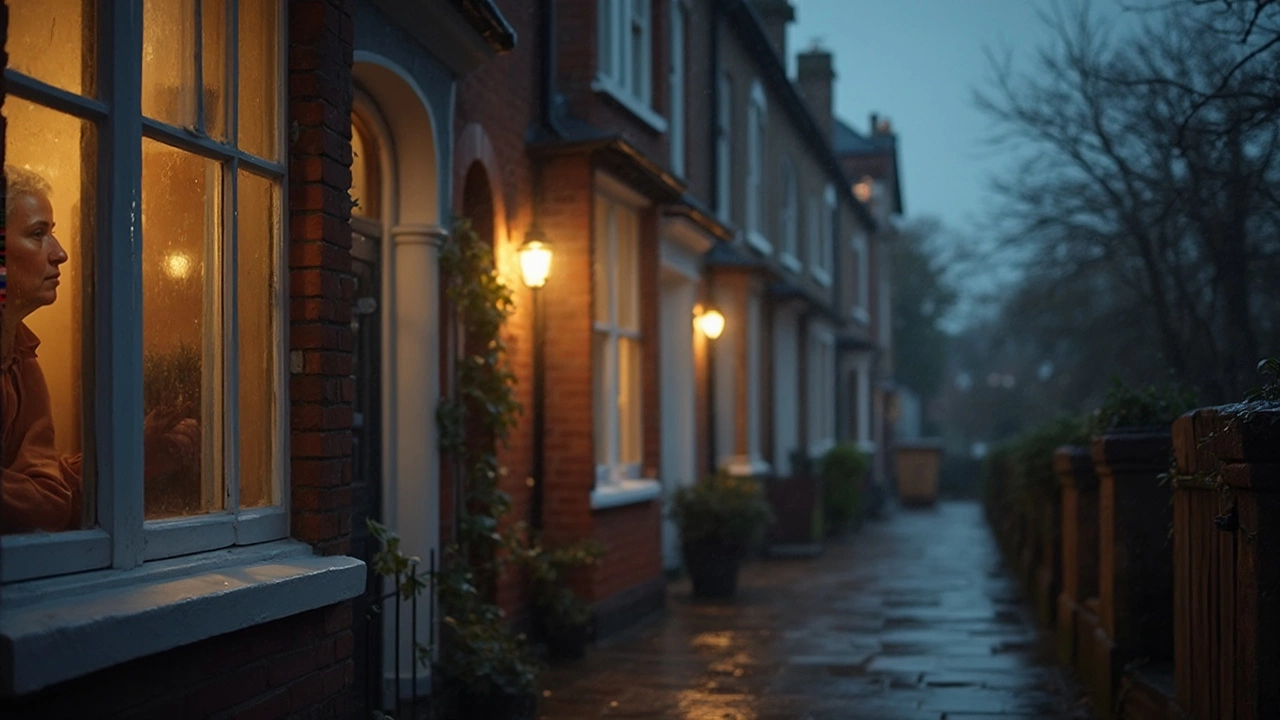A lot of people hear 'wireless security camera' and assume it needs zero cables, zero hassle, and zero internet. Reality check: wireless just means there’s no physical connection between the camera and the recorder, usually thanks to WiFi. You still need to plug most of them into power—unless they’re battery powered. And the internet? That’s where things get interesting.
If you don’t have internet, you can still use some wireless cameras for basic recording. For example, certain setups let you connect the camera directly to a local receiver, like a monitor or an NVR (Network Video Recorder) using a private WiFi network. You’ll probably be stuck viewing footage at home, though. No remote access, no push notifications, no checking your porch from your phone at the coffee shop.
- How Wireless Cameras Really Work
- What You Can Do Without Internet
- When Internet Is a Must
- Tips for Going Offline (and When Not To)
How Wireless Cameras Really Work
Wireless security cameras sound futuristic, but under the hood, they're pretty simple. The big thing to know: 'wireless' means the camera sends video and audio signals using WiFi or radio waves instead of a direct cable. It does not mean you can skip the hard work of plugging it into power—unless you shell out for a battery-powered model.
Here’s the gist:
- The camera captures video through its lens, just like a standard webcam.
- That video gets digitized and sent wirelessly to a receiver—usually an NVR (Network Video Recorder), a DVR, or your WiFi router, depending on your setup.
- Your receiver stores the footage, so you can play it back or view it live on your monitor, TV, or phone (if you set up remote access).
The receiver itself doesn’t need to connect to the internet for local recording. Many home users use a private, closed WiFi network just for the cameras and recorder—sort of like their own private TV channel. Some cameras even create their own ad-hoc WiFi, which connects directly to a phone or recording device for live viewing and storage.
Check this quick comparison of common wireless camera features:
| Feature | WiFi Cameras | Traditional Wired Cameras |
|---|---|---|
| Needs Power Cable? | Usually (unless battery-powered) | Yes |
| Needs Internet? | Only for remote access & cloud features | No |
| Access from Anywhere? | Yes, with internet | Rarely |
| Setup Flexibility | High | Low |
| Signal Interference Risk | Medium (WiFi issues) | Low |
One thing to remember—even though wireless security cameras can work offline, almost all features that feel like 'magic' (like instant phone alerts, live streaming from another city, or cloud backup) require a solid internet connection. So, while cabling woes are smaller, skipping the internet does cut back on some cool options.
What You Can Do Without Internet
If you skip connecting your wireless security camera to the internet, you’re still not totally out of luck. Plenty of recording and viewing features keep working right at home, totally offline.
- Local recording: Most wireless cameras with a slot for a microSD card keep saving video, no internet needed. It’ll store clips locally until the card fills up—then the new stuff starts overwriting the oldest files.
- Live view on local monitors: If your camera connects to an NVR or a receiver (sometimes called a base station), you can check live footage by hooking up a monitor or TV at home. Good for warehouses, shops, or just checking your backyard from the living room.
- Direct access app: Some brands let you link your phone or tablet to the camera or hub through WiFi, as long as your device is on the same network. No need for cloud logins, just hop on the app and see what’s up.
- No subscription fees: Running a wireless security camera locally means you won’t get hit with monthly cloud-storage bills or hidden fees for notifications you won’t be using anyway.
But how limiting is all this in real numbers? Here’s a quick breakdown:
| Feature | Works Without Internet? | Notes |
|---|---|---|
| Live Local Viewing | Yes | Via NVR/monitor or same WiFi app |
| Motion Detection Recording | Yes | Stored on microSD or NVR |
| Remote Viewing | No | Needs internet/cloud |
| Push Notifications | No | Needs internet/cloud |
| Cloud Backup | No | Needs internet/cloud |
| Two-Way Audio (Remote) | No | Only local connection |
So, bottom line: for on-site monitoring, recording, and playback, internet isn’t a dealbreaker. But you’ll miss out on anything that needs a connection outside your home network.

When Internet Is a Must
Here’s the deal: no matter how fancy your wireless security camera is, sometimes internet isn’t just nice to have—it’s 100% required. It all depends on what you want your camera to actually do.
If remote access is your thing—meaning you want to check video from your phone while you’re out and about—the camera absolutely needs to be online. Cloud storage, where footage is saved not just on your recorder but also on servers somewhere else? Yep, that also demands internet access. Without an internet connection, every smart feature tied to notifications, real-time alerts, voice assistants like Alexa, or integrations with Google Home are gone.
- If your camera uses a dedicated app to send instant push alerts when it detects movement, internet is non-negotiable.
- Most cameras that back up recordings to the cloud stream the footage directly, which basically eats up your WiFi bandwidth. No internet—no uploads.
- Firmware updates for your camera? Those come through the internet. Without them, your camera could miss security patches or improvements.
Not convinced? Check out how core features stack up depending on internet connection:
| Feature | Needs Internet? |
|---|---|
| Live remote viewing (anywhere) | Yes |
| Push notifications to your phone | Yes |
| Cloud backup | Yes |
| Local viewing on a connected monitor/NVR | No |
| Manual on-site video download | No |
Another heads-up: some budget cameras won’t even let you set them up without internet. They need to download settings or verify your account during install. Even pricier models like Arlo or Nest require an internet connection for setup, updates, and smart features. So, if you want the full power of your wireless security cameras, a decent, steady internet connection isn’t optional—it’s part of the deal.
Tips for Going Offline (and When Not To)
If you’re tempted to set up your security cameras without internet, there are a few tricks—and serious trade-offs—you need to know. First, figure out what you actually want from your wireless security cameras. If all you need is local recording (say, to check footage after something happens), you can probably get away with it. But if you want motion push alerts on your phone or to peek in while you’re at work, going fully offline won’t cut it.
Here’s what helps if you decide to try an offline setup:
- Get cameras that have a slot for microSD cards. This lets them record video locally, storing days or even weeks of footage without needing the cloud.
- Use a Network Video Recorder (NVR) that links to your cameras through a private WiFi network. Some wireless CCTV kits come with their own NVR and don’t need internet for both streaming and backup.
- Look for cameras with built-in screens if you want quick access—they’re rare, but handy if you hate opening apps or connecting to computers.
- Test your WiFi range. If your NVR and cameras keep disconnecting, you might just need to move the NVR closer or add a simple WiFi extender.
But let’s be honest: there are moments when going offline just isn’t smart. For instance, if you travel a lot or want real-time alerts when someone’s at your front door, internet is a must. Without it, most cameras lose remote access and notification features. Cloud storage for recorded videos? That’s also out the window if you’re offline.
Here’s a quick table on what works and what doesn't if you ditch the internet:
| Feature | Works Offline? | Notes |
|---|---|---|
| Local video recording (SD/NVR) | Yes | Footage stays on device |
| Live viewing at home | Yes | Needs monitor or direct connection |
| Remote live viewing (phone/computer) | No | Internet required |
| Motion alerts & notifications | No | Needs cloud or online service |
| Cloud backup | No | Internet mandatory |
Short story: choose your setup based on what features matter most. If you just want proof of what happened and don’t care about fancy alerts or smartphone access, an offline setup with a wireless security camera system is totally doable. But if you love control and instant updates, not having internet is a pain. Decide what trade-offs you can live with—don’t find out when it’s too late.

